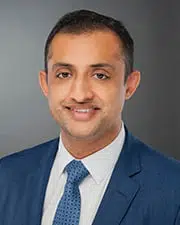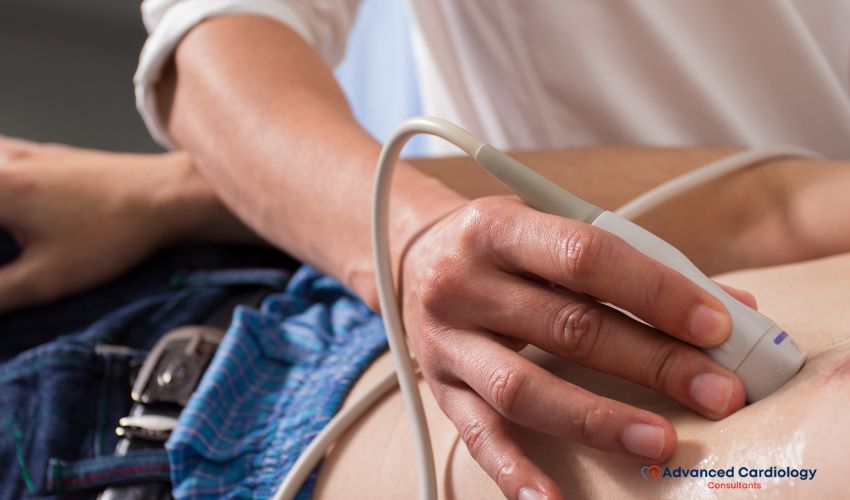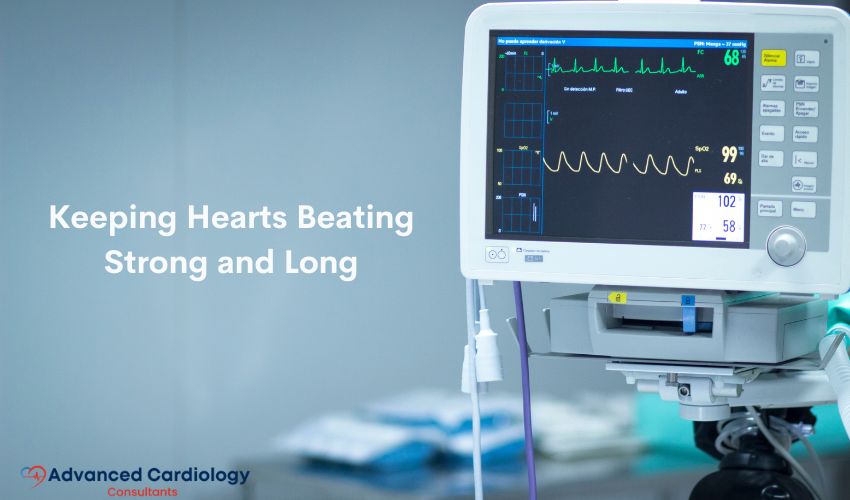Long-Term Rhythm Recorder Implants in Katy for Ongoing Heart Monitoring
Get accurate, long-term heart rhythm monitoring with implantable recorders at our Katy clinic. Whether you’re experiencing unexplained fainting, intermittent palpitations, or suspected arrhythmias, our board-certified cardiologist provides expert evaluation and personalized care—offering same-week appointments for timely diagnosis.
What Is a Long-Term Rhythm Recorder and How It Works
A long-term rhythm recorder, also known as an implantable loop recorder (ILR), is a small device placed just beneath the skin to monitor your heart’s electrical activity continuously over months or even years. It’s ideal for diagnosing elusive heart rhythm issues that aren’t caught during short-term testing like EKGs or Holter monitors. The device automatically records abnormal rhythms and can also be triggered manually when symptoms like fainting or palpitations occur.
At Advanced Cardiology, we use state-of-the-art cardiac monitoring tools to ensure you receive accurate, long-term data about your heart’s rhythm. Our Katy clinic serves patients across Sugar Land, Richmond, and the Greater Houston area with cutting-edge diagnostics and compassionate, one-on-one care.
Your care will be overseen by Dr. Adnan Khalid, a board-certified cardiologist with years of experience in heart rhythm disorders. He’ll assess your symptoms, determine if a rhythm recorder is right for you, and provide ongoing evaluation of the data the device collects—guiding the best treatment options based on real-time, real-life insights.
Meet the Cardiologist

Adnan Khalid, MD, Cardilogist
Education
Dr. Adnan Khalid, MD
Adnan Khalid, MD, specializes in treating coronary artery disease, peripheral artery disease, heart failure, hypertension, arrhythmias, and hyperlipidemia. He has over 10 years of experience in the field of cardiovascular medicine.
Dr. Khalid graduated from his medical school among the top 10 out of 250 medical students in his class. He is fellowship trained in cardiovascular diseases, interventional cardiology, advanced heart failure, and transplant cardiology. He is focused on providing personalized and compassionate care. Dr. Khalid believes in spending time with his patients and listening to their needs and is committed to offering excellent care.
Dr. Khalid is an avid reader. He is eager to learn new things; He likes to work out and spend time with his family. When off from work, he likes to travel and spend time in nature along with family and friends. He is married with three children. Dr. Adnan Khalid is now seeing patients at our Katy and Sugar Land clinics—accepting new patients from Houston and surrounding areas.
Board Certifications
American Board of Internal Medicine
Interventional Cardiology


Why Cardiologists Recommend a Long-Term Rhythm Recorder
Get clarity and peace of mind with long-term rhythm monitoring in Katy, Sugar Land, and Houston. Our cardiologist may recommend a long-term rhythm recorder when symptoms are intermittent or inconclusive on standard EKGs and Holter monitors. These devices allow for continuous monitoring over several months, making it easier to detect hidden heart rhythm issues that could affect your health.
Common Symptoms That May Require a Long-Term Rhythm Recorder:
Unexplained Fainting (Syncope)
Why It Matters: Sudden loss of consciousness can signal a serious heart rhythm disturbance.
How Long-Term Monitoring Helps: Records electrical activity at the time of the episode—even months apart—helping confirm or rule out arrhythmias as the cause.
Intermittent Palpitations or Irregular Heartbeats
Why It Matters: Occasional episodes can be difficult to capture during a standard 24-48 hour Holter test.
How Long-Term Monitoring Helps: A loop recorder detects rare arrhythmias like AFib, SVT, or PVCs that come and go unpredictably.
Suspected Silent AFib (Atrial Fibrillation)
Why It Matters: Asymptomatic AFib increases stroke risk without warning signs.
How Long-Term Monitoring Helps: Tracks the heart’s rhythm 24/7 to catch even brief, unnoticed episodes of AFib.
Stroke or TIA of Unknown Cause
Why It Matters: Cryptogenic strokes may result from undiagnosed AFib.
How Long-Term Monitoring Helps: Provides extended surveillance to uncover previously undetected rhythm disturbances contributing to stroke.
Post-Ablation or Pacemaker Monitoring
Why It Matters: After treatment for arrhythmias or device placement, ongoing rhythm tracking is essential.
How Long-Term Monitoring Helps: Assesses treatment success or early detection of recurrence.
When heart symptoms are infrequent but potentially dangerous, Advanced Cardiology offers continuous, implantable rhythm monitoring to keep your heart health in focus—day and night.
What Long-Term Rhythm Recorder Results May Reveal
Long-term rhythm recorders provide detailed insight into your heart’s electrical activity over weeks or months, capturing events that short-term tests might miss. This continuous data helps your cardiologist diagnose and manage a range of heart rhythm issues more accurately.
Common Findings from Long-Term Monitoring:
Atrial Fibrillation (AFib):
Often silent or intermittent, AFib episodes increase stroke risk. Detection allows timely anticoagulation therapy to reduce this risk.
Bradycardia (Slow Heart Rate):
Prolonged pauses or slow beats may indicate the need for a pacemaker to prevent fainting or fatigue.
Tachyarrhythmias (Fast Heart Rhythms):
Includes supraventricular tachycardia (SVT) and ventricular tachycardia, which can cause palpitations, dizziness, or more serious complications.
Heart Block:
Interruptions in the heart’s electrical signals may be detected, prompting further intervention.
Symptom-Rhythm Correlation:
Linking your symptoms like dizziness, palpitations, or syncope with recorded arrhythmias to tailor treatment precisely.
Based on these results, your cardiologist can decide on the best course of action—whether medication adjustments, ablation procedures, or device implantation—aiming to improve your heart health and quality of life.
At Advanced Cardiology in Katy and Sugar Land, we combine cutting-edge technology with expert care to ensure you get accurate diagnoses and effective treatment plans.

When Is It Time to Consider a Long-Term Rhythm Recorder Implant?
If you experience unexplained heart symptoms or your doctor suspects intermittent arrhythmias that don’t show up on short-term tests, a long-term rhythm recorder implant can provide answers. Our advanced monitoring in Katy and Sugar Land offers continuous heart rhythm tracking to catch elusive issues.
You should consider long-term rhythm monitoring if:
-
You have unexplained dizziness, fainting, or palpitations
-
Short-term EKG or Holter monitor results were inconclusive but symptoms persist
-
You have known arrhythmias that require ongoing monitoring
-
Your cardiologist wants to evaluate the effectiveness of heart medications or treatments over time
Early detection through long-term monitoring can help prevent serious complications like stroke or heart failure by guiding timely treatment.

Insurance and Coverage for Long-Term Rhythm Recorder Implants
Most major insurance plans cover long-term rhythm monitoring devices when medically necessary, helping make this advanced heart care accessible. Coverage often includes the implant procedure, device monitoring, and follow-up visits.

Decisions Based on Long-Term Rhythm Recorder Results
Whether you’re facing unexplained fainting, irregular heartbeats, or stroke risk, long-term rhythm recorder implants offer data-driven answers that help guide timely care. Your cardiologist will use the recorded data to make informed decisions, including:
-
Starting or adjusting heart medications based on detected arrhythmias
-
Referring for additional interventions, such as ablation or pacemaker placement
-
Identifying the cause of syncope (fainting) and preventing future episodes
-
Tailoring lifestyle recommendations to reduce stroke risk and improve heart function
New Patient Paperwork At Advanced Cardiology
Please print out your paperwork and bring it to your appointment at Advanced Cardiology. If your insurance requires authorization, please be sure to have that information sent to our office or bring it with you to your appointment, along with any medical records you may have. Please also make sure to bring your insurance cards, photo ID, and medication list.
Thank you, and we look forward to meeting you! Contact us today with any questions.
Call to Schedule Your Appointment!
Most insurance plans accepted
(713) 258-6111
Houston Cardiologist
We diagnose and treat heart disease, such as congenital heart defects, coronary artery disease, heart rhythm disorders and heart failure.
About our Cardiologist: Comments from our Patients
# Cooperative & professional staff. Dr. Khalid is highly competent & experienced. Very kind & friendly too.
# He’s A Very Caring & Concerned Doctor. He Asks Important Questions, He Allows Me To Ask Questions & Fully Answers To My Satisfaction. He Diagnosis & Does Whatever It Takes To Fix My Health Issues. He’s A Wonderful Doctor…& Most Of All, I Trust Him & His Staff.
Read More…..
Where Houston Hearts Heal – Advanced Cardiovascular Care
Heart health isn’t just important — it’s life-defining. For individuals facing cardiovascular challenges, timely access to expert care can make all the difference. In Houston, advanced cardiovascular care combines cutting-edge diagnostics, innovative treatment…
